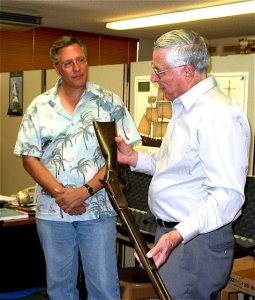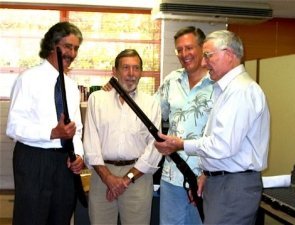 |
News Release Famous Rifles of the American Frontier Days Are Presented
to Pitcain Islands Study CenterAngwin – After more than 60 years
on one of the world’s most remote islands and more than 100 years after their
manufacture, two rifles that are famous for being among “The Guns that Won
the American West” have found a home in the Pitcairn Islands Study Center
at Pacific Union College here.
 |  |
| Herbert Ford, director of the Pitcairn
Islands Study Center at Pacific Union College, examines a famed “Winchester
73” rifle which has been donated to the center, as Michael Patris, donor’s
executor, looks on. Photo by Duane Cronk. (Click on photo for larger image.) |
The firearms, both closely associated with the American frontier of
the 19th century, are a gift to the center from the estate of the late Southern
California gun collector Frank Q. Newton, Jr., and have just been presented to
the study facility by Michael Patkis, executor of the Newton Estate. Present
for the presentation late last week were former Pitcairn Islands governmental
Commissioner Leon Salt of Auckland, New Zealand; Bill Newton, brother of the donor;
and Patkis. The rifles include one of the famous “Winchester 73's,”
that were first manufactured in 1873 by the Winchester Firearms Company and were
commonly known as the “Gun That Won the West.” The other gun is a Colt
“Lightning” 44 caliber rifle, manufactured in 1887 by the Colt Firearms
Company in Hartford, Conn. “The guns have come to the Pitcairn Islands
Study Center because for more than 60 years, from 1890 until 1956, they were used
on Pitcairn Island in the South Pacific Ocean by William Christian and later by
Floyd McCoy, both of whom were direct descendants of Fletcher Christian and William
McCoy, sailors who mutinied against Captain William Bligh on the ship H.M.S. Bounty,”
said Herbert Ford, director of the study center. The sailors’ 1789
revolt, which has come to be known worldwide as “The Mutiny on the Bounty,”
has been the subject of five major Hollywood-type motion pictures and hundreds
of books written over a period approaching 200 years.
 |  |
Herbert Ford, director of the Pitcairn Islands Study
Center at Pacific Union College, displays a famed “Winchester 73” rifle
that has been donated to the center with (from left) former Pitcairn Islands’
Commissioner Leon Salt, Bill Newton and Michael Patkis. Commissioner Salt holds
an antique Colt “Lightning” rifle that was also donated to the study
center from the estate of gun collector Frank Q. Newton, Jr. Photo by Duane Cronk.
(Click on photo for larger image.) | “In 1956, the
guns were sold by McCoy to Frank Newton for his gun collection,” said Ford.
“Following Newton’s death, his estate executor, Patkis, recently decided
to donate the guns to the study center because they are an important part of Pitcairn’s
history.” According to Patkis, it is thought that Christian probably
purchased or bartered the rifles from crew members or passengers on ships that
called at Pitcairn Island in the 1800s. Upon his death, they came into the hands
of McCoy, who served as Pitcairn’s police officer in the 1950s. The
inhabitants of Pitcairn Island have long made use of light firearms to eliminate
wild goats that invade their gardens, or to shoot breadfruits down from the tops
of trees on the island. The Pitcairn Islands Study Center, founded in
1977 on the Pacific Union College campus, provides information wroldwide to scholars,
researchers, authors and others about “The Bounty Saga.” Comprising
the world’s largest collection of material about the saga, it also gives
direct help of various kinds to the Pitcairn people. ### Pitcairn Islands Study Center, 1 Angwin
Ave., Angwin, CA, USA. Herbert Ford, 707-965-6625, 707-965-2047, Fax: 707-965-6504,
Email: hford@puc.edu, Website: http://library.puc.edu/pitcairn |





